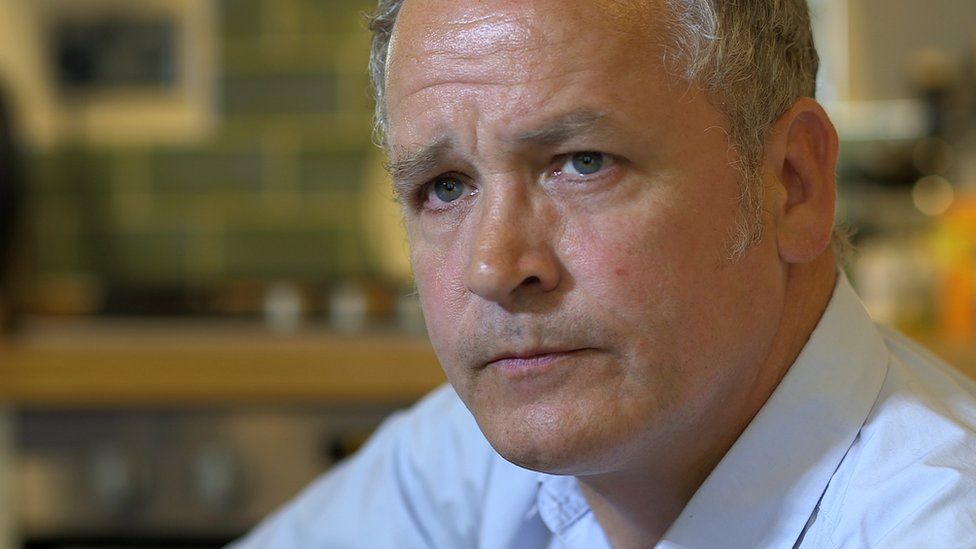Why I secretly taped my disability assessment
- Published

Every month 60,000 ill and disabled people have their needs assessed for benefits. Some are so worried about the process that they are using mobile phones to secretly record those interviews, critics say. But using that evidence to overturn a decision is not straightforward.
In 2015, Nev Cartwright sat down with his specialist at a hospital in Leeds. He was told his hacking cough and breathing difficulties were caused by a tumour in his left lung. He was 45.
Since then he has had three operations and a lung removed. Nev was awarded the highest rate of Disability Living Allowance (DLA) - a benefit meant to pay for the extra costs of his condition.
But a year later he received a letter saying the DLA was being replaced by a new benefit, the Personal Independence Payment, and his needs would have to be reassessed by a private company.
The night before his assessment he watched a documentary which questioned how they were being conducted.
"I was really nervous about it and made the decision to audio record the interview covertly. It was a safeguard, an accurate record of what had taken place," he says.
'Completely altered'
The face-to-face assessment is typically an interview with a health professional, such as a nurse or paramedic, lasting between 30 and 90 minutes. It can also include basic medical tests and a physical examination.
The claimant is assessed depending on their ability to complete day-to-day tasks. That report is sent to an official at the DWP who will then decide the final level of disability benefit that person is awarded.
But things did not go as planned. Nev says he had misgivings from the start but it was only later, when he saw the assessor's final report, that he realised something was seriously wrong.
"Some details discussed in the interview were not in the report and others were completely altered," he says.
"She said she'd done a physical examination of my mobility. It was very evident on the audio recording, that she never did that at all."
On his phone recording you can clearly hear the assessor carrying out a peak test to measure his lung function, and reading out the data.
But in the final report, his last reading appears to have doubled from 150 L/min to 300 L/min, making him seem better than he actually was.
"I totally agree that anyone entitled to benefits should have their needs assessed," he says. "But everyone deserves just and fair treatment."
Tribunal appeal
After his interview Nev had his disability payments cut and had to return the car paid for by the mobility element of his benefits.
He wrote to the DWP and told them about his recording, sending them a written transcript put together by an independent firm.
Under government rules, secret or covert recording like this is banned. If it is spotted, the claimant is told to stop. If they refuse it is likely that their benefit application will be rejected.
The government tried to get his recording thrown out before his appeal at tribunal.
But exceptionally, in his case the judge agreed a transcript could be entered into evidence. He went on to win his case and his car was eventually returned.
"I've wasted 12 months of my life in an unfair fight with a government department and the people who work for it," he said.
The private company which carried out his assessment says its "high standards were not met on this occasion" and it has now changed the way it gathers evidence in cases like this.
Recording pressure
Critics of the assessment process say formal audio recording of all PIP interviews should be mandatory and available to both sides.
"It would remove the distrust and give so much transparency to everyone," said Tony Lea, lead welfare rights officer at Benefit Resolutions, a disability advocacy service which has been campaigning for a rule change.
As things stand the official rules are complex.
A claimant does have the right to ask for a PIP interview to be formally taped and used as evidence, but unlike other disability benefits like ESA, they have to provide their own equipment.
This must be a secure, tamper-proof double recorder which can cost as much as £1,500. A mobile phone, digital recorder or dictaphone does not meet the requirements.
In March, a major independent review of the PIP system commissioned by the government recommended switching to compulsory audio recordings with an opt-out for people who do not want it.
The government says it is "considering the results" of a pilot of recording in the West Midlands.
A spokesman for the DWP said: "Anyone is free to record their face-to-face consultation, but it must be done in a way that best protects both claimants and assessors."
Nev says his experience shows that some vulnerable people need more protection.
"I should probably be more diplomatic but I think the whole system is a mess," he adds.
"The importance for me of getting that audio recording into evidence was the potential to help other people in the future."
Watch the Victoria Derbyshire programme on weekdays between 09:00 and 11:00 on BBC Two and the BBC News channel.
- Published14 April 2017
- Published2 May 2017
- Published22 November 2016